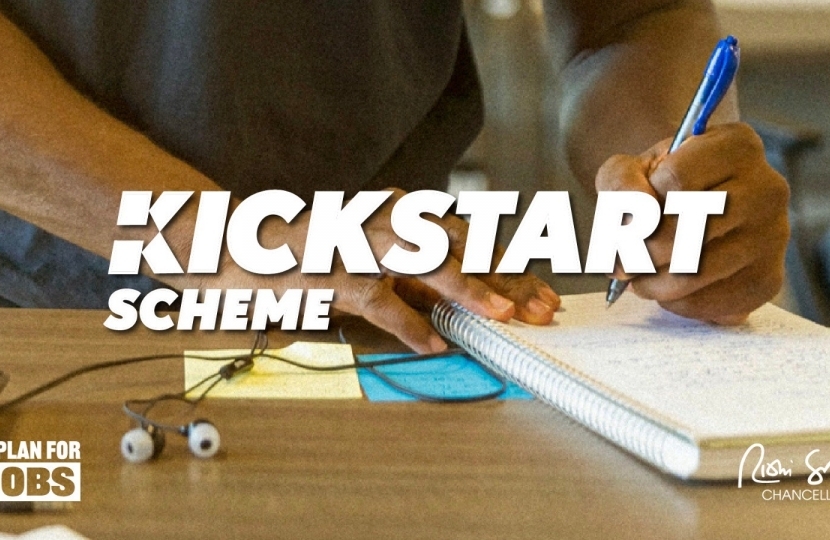
- New £2billion Kickstart scheme will create thousands of new jobs for young people across UK as part of coronavirus recovery
- Those on Universal Credit aged between 16 and 24 will be offered six-month work placements, with wages and training costs paid by the government
South Swindon MP Robert Buckland is urging employers across the town to sign up to the government’s landmark new Kickstart scheme and help young people into work.
The £2billion scheme has been designed to ensure young people at risk of long-term unemployment have a future of opportunity and hope by creating quality, government-subsidised jobs across the UK, helping to spur the country’s economic recovery after the coronavirus pandemic.
Under the scheme, announced in June as part of the government’s Plan for Jobs, employers that sign up will be able to offer youngsters aged 16 to 24 who are claiming Universal Credit a six-month work placement that is fully funded by the government.
This means the government will pay 100% of the young person’s age-relevant National Minimum Wage, National Insurance and pension contributions for 25 hours a week, which the employer can top up if they choose to.
The government will also pay the employer £1,500 for each young person they take on, to support any training or associated costs like uniforms they might incur when setting up the scheme.
The scheme will initially be open until December 2021, but there is the option for it to be extended.
Young people will be referred into the new roles through their Jobcentre Plus work coach, with the first Kickstarts expected to begin at the start of November.
Commenting, Robert Buckland MP said:
“Since becoming MP for South Swindon in 2010, I have worked hard to tackle youth unemployment in the town and pre COVID this had gone down by 61.3%
“We have many bright young people here in Swindon and I am determined that despite the economic cost of COVID, they are given the opportunities they deserve and the chance to succeed through the Government’s Plan for Jobs, which includes this scheme and new government cash incentives for employers to take on apprentices.”
Commenting, Chancellor of the Exchequer Rishi Sunak said:
“This isn’t just about kickstarting our country’s economy – it is an opportunity to kickstart the careers of thousands of young people who could otherwise be left behind as a result of the pandemic.
“The scheme will open the door to a brighter future for a new generation and ensure the UK bounces back stronger as a country.”
Commenting, Work and Pensions Secretary Therese Coffey said:
“Kickstart is the most ambitious youth employment programme in this country’s history, with an unlimited number of placements available and a commitment by this government to pay every Kickstarter’s wages for six months.
“We are putting young people at the heart of our recovery by investing in potential, opening up opportunities and harnessing hope.
“Together we will build back better, come back stronger and look forward to a prosperous future.
“Employers should sign up today.”
ENDS
Notes
Since the start of the pandemic, we have introduced an unprecedented package of measures to help protect people’s incomes and jobs by:
- Introducing a package of measures to support jobs and livelihoods across the UK with around £160 billion of support. This includes protecting 9.6 million jobs through the furlough scheme at a value of £34.7 billion, approving over 1.4 million Bounce Back loans worth nearly £35 billion and putting an extra £9 billion into the welfare system (HMT, Plan for Jobs, 8 July 2020, link; HMRC, Coronavirus Statistics, 11 August 2020, link; HMT, Business loan scheme statistics, 11 August 2020, link).
Through our Plan for Jobs, we are supporting employment and creating new opportunities by:
- Creating hundreds of thousands of new fully subsidised jobs for young people through a new £2 billion Kickstart Scheme, to give young people the best chance of getting a job. The scheme will directly pay businesses to create new, decent and high-quality jobs for any 16-24 year old at risk of long-term unemployment. Funding available for each job will cover 100 per cent of the National Minimum Wage for 25 hours a week, for six months in total, plus an admin fee – for a grant of around £6,500 per placement. There will be no cap on the number of places available, and our £2 billion will initially fund hundreds of thousands of new placements (HMT, News story, 8 July 2020, link).
- Paying businesses £1,000 to take on Trainees, with triple the number of places there are now, to get young people ready for work. We will provide £111 million to triple the scale of Traineeships, which consist of work experience placements, training and work preparation for 16-24 year olds. We will also increase the eligibility of Traineeships to include young people qualified up to Level 3 (advanced – equivalent to 2 good A Level passes), up from Level 2 (intermediate – equivalent to achieving 5 GCSEs at 9-4) currently (HMT, News story, 8 July 2020, link).
- Providing £2,000 to employers for each new apprentice they hire aged under 25, helping more people into the workplace while developing key skills. We will also provide £1,500 for any apprentice over 25 (HMT, News story, 8 July 2020, link).
- Giving young people who have just left school the skills they need to find work in high-value sectors, such as engineering, construction and social care. We will provide £101 million to help 18 and 19 year olds to take high value courses at Levels 2 and 3 where work opportunities are not available (HMT, News story, 8 July 2020, link).
- Expanding the support on offer to help people find a job, so they can get back on their feet and into work. We will: double the number of Work Coaches through Job Centre Plus to 27,000; provide an extra £150 million into the Flexible Support Fund to remove barriers to work; and help DWP react quickly to large-scale redundancies by expanding the Rapid Response Service. We will provide £32 million to recruit more advisers for the National Careers Service, so that it can provide advice to 269,000 more people. In total, these measures are worth over £1 billion (HMT, News story, 8 July 2020, link).
The Kickstart scheme will create more opportunities for young people:
- Wages will be paid up to 25 hours per week at the age-relevant National Minimum wage, and pension contributions will be the statutory automatic enrolment minimum contributions.
- There are over 700,000 young people leaving education this year, who will be entering the labour market at an extremely difficult time.
- Employees aged 17 were most likely to be furloughed. 65 per cent of employments with a female employee aged 17 were furloughed, the equivalent figure for males was 62 per cent.
- Young people are more likely to have been furloughed than the general population (47 per cent compared to 32 per cent).
- As of July there were almost 538,000 young people aged 24 and under on UC. That figure increased by a quarter of a million from March to July.




